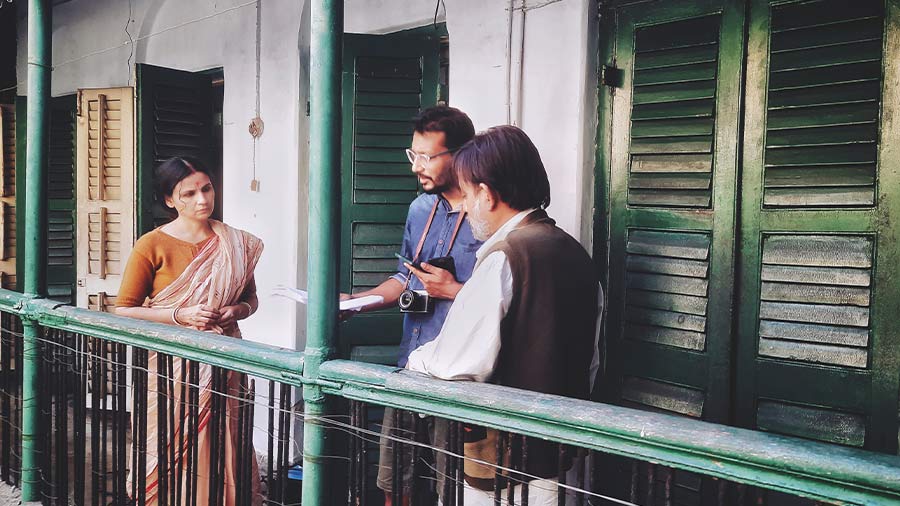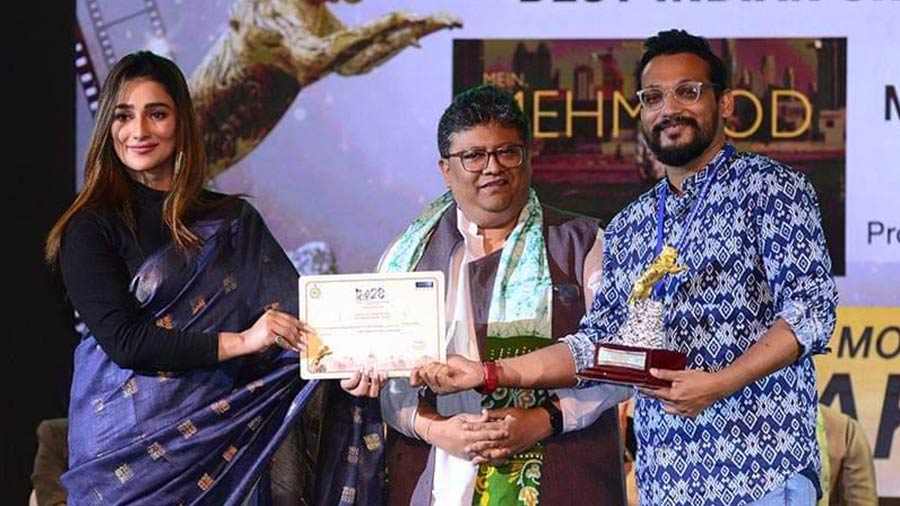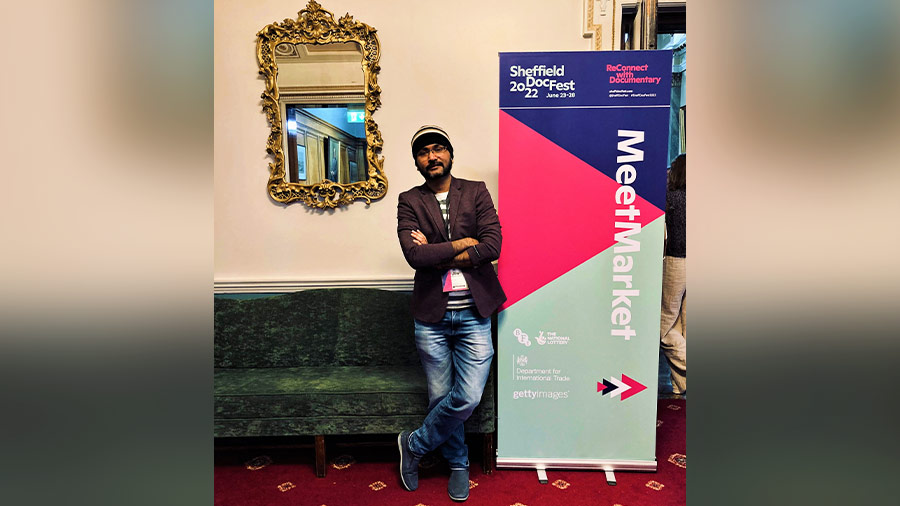As an independent filmmaker, Prataya Saha is always on the lookout for stories that are omnipresent, but are often not told. His repertoire of films deals with a variety of subjects. For instance, in The Good Wife, he portrayed the unrequited love of a housewife; in Just Another Day, he chronicled a pregnant victim of domestic abuse; and in Mein, Mehmood (I Am, Mehmood), he ventured into the world of an apprehensive immigrant, earning him the Best Short Film Award at the Kolkata International Film Festival (KIFF).
His latest film, Shonar Khacha (The Golden Cage), speaks of the plight of an ancestral residence in Kolkata on the verge of being sold by the remaining family members. In a short while, the film has made waves in the industry and is set to be screened at the International Film Festival of South Asia (IFFSA), Toronto, on October 16. It also began its Oscar-qualifying run on September 22, with a limited theatrical release in Oakland, California.
In an interview with My Kolkata, Saha spoke about his life after his KIFF win, the making of Shonar Khacha, and more. Edited excerpts from the conversation…
My Kolkata: How has life changed after Mein, Mehmood?
Prataya Saha: Drastically, and in a good way. Mein, Mehmood has done phenomenally well. Normally, a film follows the festival circuit for a year or 12 months before its OTT release, but Mein, Mehmood is still going strong on the circuit. Life has changed significantly; people are genuinely appreciating the film, and it's boosting my confidence. That’s where the change lies.
Shonar Khacha is your first Bengali film. Any reasons why you decided to pivot from making your films in English to Bengali?
Although I began my education in English at a Catholic school, both at school and at home, there was a strong emphasis on mastering proper Bengali. As a Bengali, I take great pride in my mother tongue, which is undeniably a beautiful language with a rich literary heritage.
The shift back to Bengali felt like a natural return to my roots, almost like a homecoming. I had longed to create a Bengali film for some time, but due to my absence from Bengal since 2004, and a lack of connections in the local art scene, it remained a distant goal. However, my involvement with people at the Kolkata International Film Festival proved to be the right opportunity to work in Bengali.
Your film revolves around an old house and its fate in the hands of the current generation. What made you choose this topic?
This is a very personal topic for me, because I witnessed it growing up in Kolkata during the ’90s. I saw how it affected my extended family and my friends’ families. As a Kolkatan, there’s nothing new about this story; it’s a common occurrence. However, I felt it was crucial to address it because I wanted to offer a different perspective on the conflicts that often tear families apart. You can walk through a neighbourhood in Kolkata and spot a house where one half is well-maintained, and the other half is neglected. This visual divide is a clear sign of ongoing feuds within families, where one person can afford to maintain the house, while the other cannot. This division can eventually lead to the destruction of the entire structure. So choosing to make a film about it felt natural. The house itself becomes a character in the story, reflecting a broader perspective of the city.
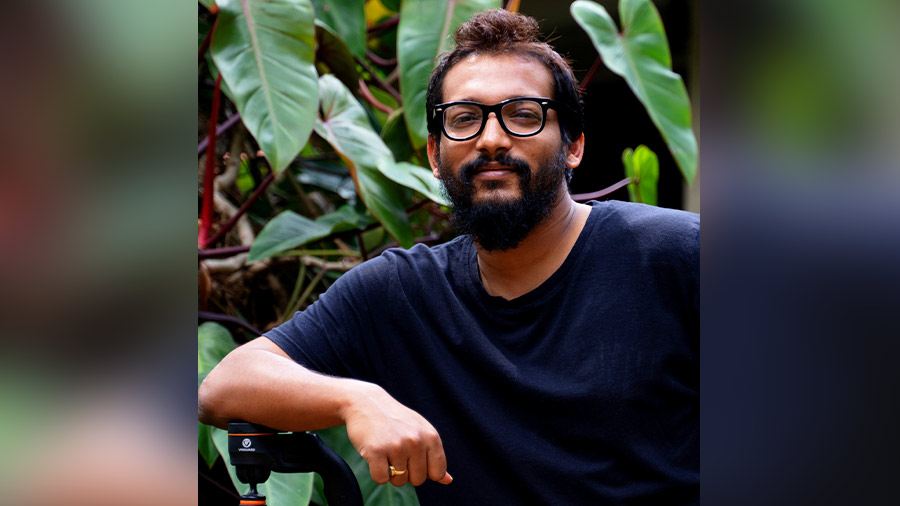
‘This is a very personal topic for me, because I witnessed it growing up in Kolkata during the ’90s. As a Kolkatan, there’s nothing new about this story; it’s a common occurrence,’ says Saha
Tell us a little bit about the house in your film.
It’s a fascinating story. Initially, I was in Bangalore when this project was taking shape, just after COVID. I had assembled a crew from Bangalore to work on it, and they were all set to fly in. However, things took an unexpected turn. Someone had sent me pictures of an old house (near Maniktala) taken with a wide-angle lens on their phone, making it seem more spacious than it actually was. When I arrived in Kolkata three days before the shoot, I realised the house wouldn't work because it was too cramped for lights, generators, and crew movement, despite its historical charm.
So, by sheer accident, I stumbled upon the building we eventually used. I came across a Facebook post where someone had shared a photo of the house on Kabi Sukanta Sarani, mentioning that it was available for film shoots. I didn't even have a precise location; it was just a Facebook post with a vague reference. But I was desperate, so I decided to give it a try. I drove about 15 minutes to check it out, and to my astonishment, the house existed! It was exactly what I needed – a 235-year-old building with interiors that were a perfect fit for the film. It was like a stroke of divine intervention.
In a nutshell, the house worked perfectly for the film – the interiors, the sofas, the beds, and the overall texture of the house, which had not been well-maintained, all contributed to the film's atmosphere.
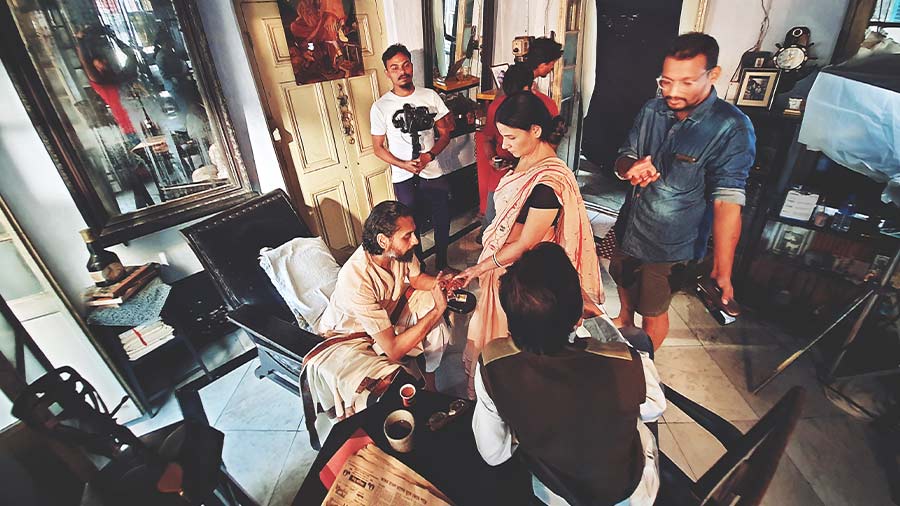
The cast and crew at work inside the house
Tell us about the team that made Shonar Khacha possible.
I can't help but look back at the journey of creating this film and the incredible team that came together to do it. It felt like a family reunion in many ways, and that bonding was vital to our success. Working with Anshulika Kapoor (who plays Anjali in the film) for four projects back-to-back has created a unique understanding, where it feels like she knows what I’m thinking at times. This level of trust and collaboration makes the chaotic film set environment much more manageable and elevates the project. Bengali actress, producer, and dancer Anindita Banerjee Roy dubbed Anushilika’s part in the film.
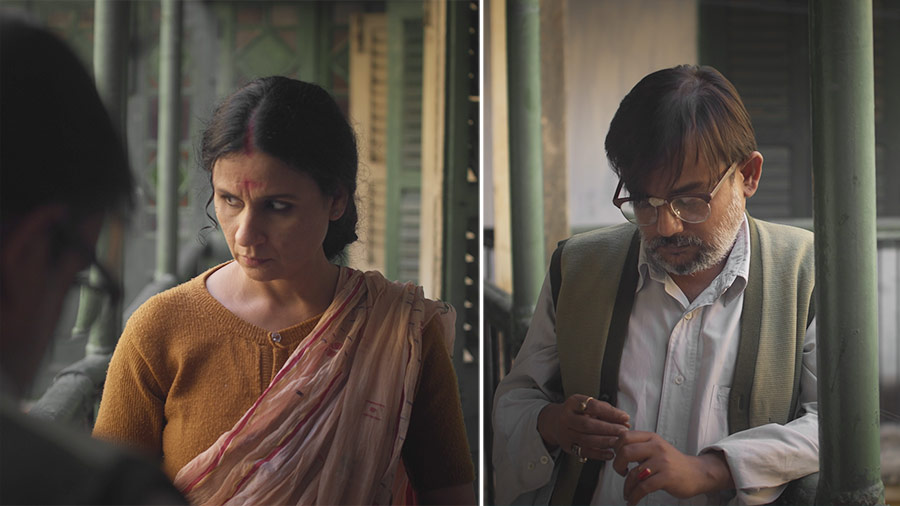
Anshulika Kapoor and (right) Deboprasad Halder in scenes from the film
Sounak Sen Barat (who plays Rajatabho in the film) is a multifaceted genius, excelling in various areas such as fashion design, oration and even composing music. He even sang the last song in the film. His attention to detail as a production designer was remarkable.
Moreover, working with Deboprasad Halder (who plays Rudro) and Sanjeev T., who is the music director of the film, has been incredibly enriching.
It was an emotional journey, where everyone worked together like a family, driven by a shared passion for the craft. This film showed me that even with a minimal budget, you can create an authentic and engaging cinematic experience.
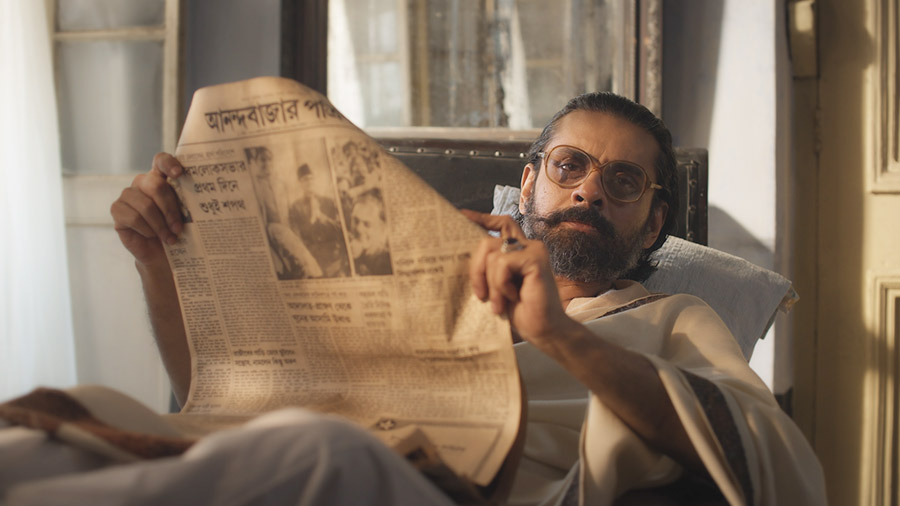
Sounak Sen Barat plays Rajatabho in the film
What keeps you motivated through the process of filmmaking?
You see, if I’m entirely honest, there's always this metaphorical axe or guillotine hanging over my head. The thought of quitting crosses my mind now and then. It’s not discouraging, especially for emerging filmmakers or those who are already established. Instead, it serves as a reality check, a reminder that you have to keep moving, stay on your toes and never slack off. It’s a tedious journey, but appreciation plays a crucial role. I don’t want to be one of those who claim, “I make films for myself.”
I want the audience to experience them. I aim to contribute meaningfully to society as an artist. Appreciation is pivotal. I always emphasise that the press, particularly independent artists and the press, mutually depend on each other. It’s because validation and assurance come from these interactions, confirming that you are striving to produce commendable work. When you receive appreciation from the audience, it reinforces the belief that you are on the right track. Winning a prestigious award is like receiving a pat on the back, urging you to keep going, assuring you that you’re doing something worthwhile.
